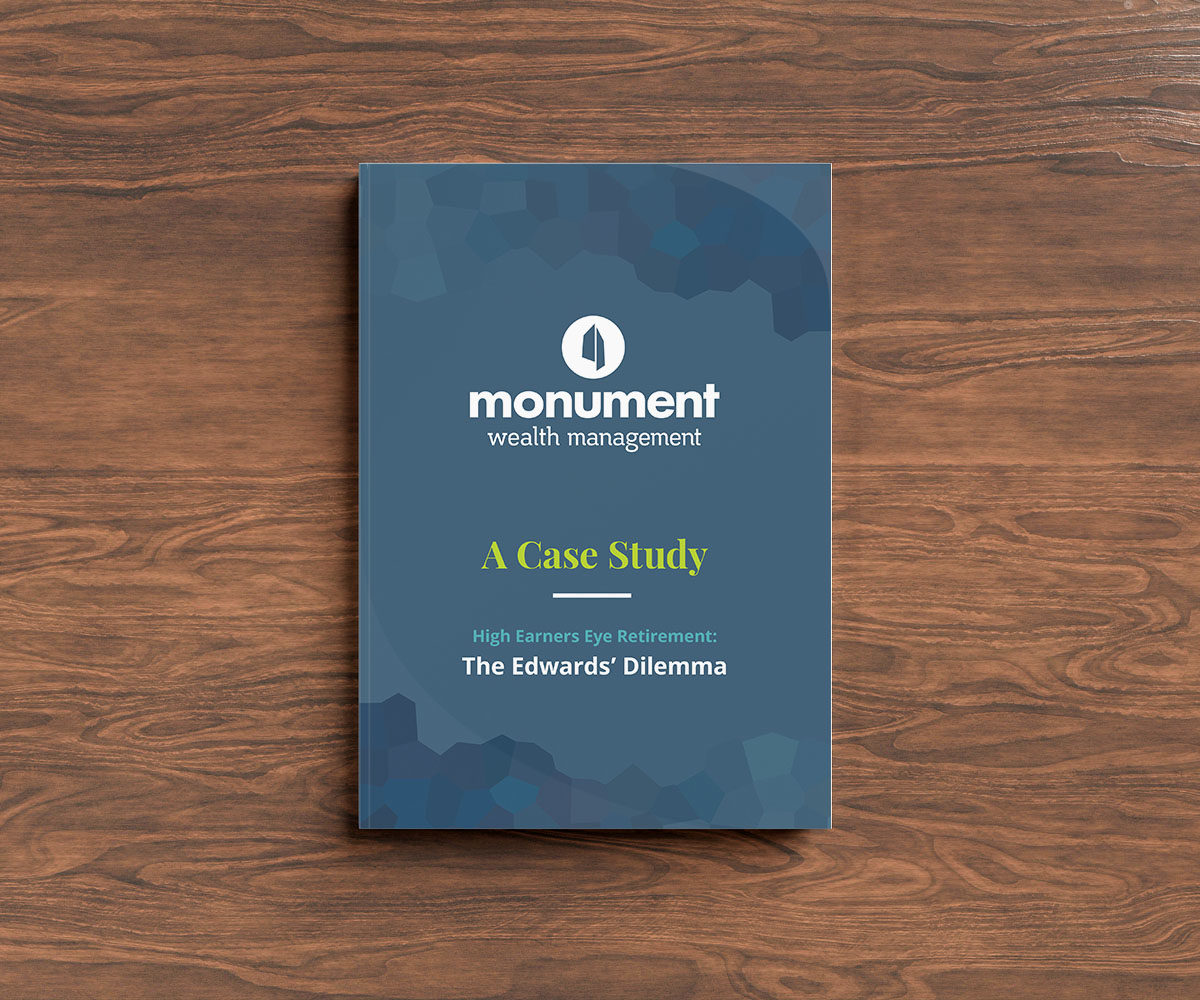Monument Wealth Management Articles
Will Your Heirs Face a Large Estate Tax Bill?

Share on your favorite platform, or by email
Taxes are a fact of life, like it or not. But are they also a fact of death?
The answer may surprise you – the Tax Policy Center estimated that of approximately 2.8m people to pass away in 2020, 4,100 estate tax returns would be filed, and only 1,900 would be taxable. That means almost half of the returns represent taxable estates, but the number of taxable estates relative to the number of deaths is a rounding error (0.1%).
If so few people actually owe estate taxes when they die, why do we make such a big deal about them? Because our wealth, and the goals we have for that wealth, are deeply personal and emotional, especially when it comes to thinking about what we leave behind for those we love.
Read on to see if you are part of the 1,900 and what you can do about it if your goals don’t include giving the government a chunk of your wealth.
Federal Estate Tax 101 – A Quick Primer
The federal government sets a lifetime estate tax exemption amount that can be gifted during life or at death free of taxes. If the value of your gross estate exceeds the exemption amount in the year you pass away, your estate may be subject to estate taxes.
Amounts above the exemption will be subject to a 40% tax (as of current law). This is a very simple starting point…as with anything related to taxes, there’s more complexity and nuance when it comes to actually calculating the amount subject to taxes because of things like deductions (including the value of assets transferred to your spouse at your death if you are married or to charity), taxable gifts made during your lifetime, and countless other factors that are best left to Federal Estate Tax 201 courses and beyond.
If your gross estate is less than the exemption amount, your estate won’t pay estate taxes.
Some states also have their own estate and/or inheritance taxes – it’s possible to transfer a large amount of money to your heirs federally tax-free while still paying estate taxes at the state level (though state rates are generally much lower than federal, topping out around %).
Who Must File a Federal Estate Tax Return?
The short answer is the executor of an estate whose gross value exceeds the lifetime estate tax exemption amount, which is $12.06M under current tax law. If your assets are below $12.06M, you may not have anything to worry about right now, but tax law is not set in stone. In fact, the current exemption amount is set to sunset in 2026, meaning that the exemption at that time will likely be half of what it is now ($6M or so) if Congress doesn’t extend current provisions.
Keep in mind that just because your executor must file an estate tax return, this doesn’t necessarily mean that your heirs will face a large estate tax bill (or any estate tax bill). It’s best to save yourself the hassle and leave the details to your team of professionals when it comes to figuring out what a potential tax bill might look like, including a trust and estate attorney, your accountant, and your wealth advisor.
Because nothing is simple when it comes to taxes… your executor may still have to file a federal estate tax return if you were married when you died, even if your gross estate is below $12.06M. If you don’t use up the full exemption amount when you pass away, the remaining amount can be transferred to your surviving spouse to increase the amount that can transfer free of estate taxes when they die. This “deceased spousal unused exclusion” provision allows married couples to effectively transfer $24.12M to heirs tax-free under current tax law – if the right forms are filed!
When Is an Estate Tax Return Due?
Working through the grief process when a loved one passes away may take years, but the IRS won’t wait that long. An estate tax return (and payment) is due within nine months of death, though an extension can be filed, giving an executor a little over a year to get their ducks in a row. A grace period of two years may exist if a return has to be filed solely to transfer the deceased spousal unused exclusion to the surviving spouse.
So You Have A Taxable Estate…
Whether your net worth exceeds the current exemption amount or you anticipate that it may, especially if the exemption amount decreases, the good news is there are ways to minimize the amount or impact of taxes your heirs may face if you plan in advance.
As a starting point, any actions you take should always be in line with YOUR answer to the question “What’s the money for?”, not anyone else’s.
Is the money for your heirs and future generations?
- Funding an irrevocable trust may be an idea to consider IF you are certain that you won’t need access to the funds you transfer to the trust and you want to take advantage of the historically high exemption amount. If this is something you are considering, make sure you partner with a team of seasoned experts who can bring clarity to the process and your decision making since irrevocable trusts are not easily changed.
- If you aren’t sure that this commitment is possible while still meeting your other goals and objectives, a wealth advisor can help you map out the implications of an irrevocable transfer and lay out different options for you to consider, like a trust that grants your spouse access to the funds while you are still alive (known as a SLAT).
- Not ready to make irrevocable decisions? You can always gift assets to your family while you are still alive – currently up to $16,000 ($32,000 for married couples) per person without the hassle of any tax reporting or reduction of your lifetime exemption amount.
- Already used up your lifetime exemption amount and still have a gross estate exceeding the exemption? In some cases, life insurance may provide a source of funds your heirs can use to pay estate taxes while preserving the rest of their inheritance.
- Life insurance can be complicated (and costly depending on your age, health, and the amount of death benefit you’d like to provide). Never go it alone if you are thinking about life insurance as an estate planning tool – professional advice unique to your situation can save you a lot of headaches down the road.
Is the money for something else, like creating a charitable legacy or enjoying life while you are living?
- If your goal is to spend down your entire estate while you are alive, a wealth advisor can help you project your cash flows through the end of your life to ensure you have enough to meet your goals and objectives and help you identify if you are at risk of leaving a taxable estate.
- Not only is giving money to charity during your life tax deductible, leaving money to charity at your death is also deductible and can reduce the amount of your estate subject to taxes. But why wait until you are gone to start building your charitable legacy? Vehicles like a Donor Advised Fund may allow you to realize your own philanthropic goals while building a charitable legacy that extends to future generations of your family.
With something as personal as your estate, any options you consider for making sure your heirs don’t face a large estate tax bill should be tailored to your unique goals and objectives for the wealth you’ve spent a lifetime building. A Monument Private Wealth Design will do just that, showing you how to meet your goals using what we know today while adapting to the unforeseen changes of tomorrow with a collaborative, creative, and customized approach that delivers the clarity you crave. Get in touch with our team for a dose of unfiltered opinion and straight-talk about your options.

It’s time to find clarity around your finances and remove the anxiety of the unknown.
Read our case study, “High Earners Eye Retirement,” to see how we helped one of our clients plan for the long term.
Ready for straightforward, unfiltered
opinion and tailored advice for YOUR questions, not everyone else’s?
IMPORTANT DISCLOSURE INFORMATION
Please remember that past performance is no guarantee of future results. Different types of investments involve varying degrees of risk, and there can be no assurance that the future performance of any specific investment, investment strategy, or product (including the investments and/or investment strategies recommended or undertaken by Monument Capital Management, LLC [“Monument”]), or any non-investment related content, made reference to directly or indirectly in this blog will be profitable, equal any corresponding indicated historical performance level(s), be suitable for your portfolio or individual situation, or prove successful. Due to various factors, including changing market conditions and/or applicable laws, the content may no longer be reflective of current opinions or positions. Moreover, you should not assume that any discussion or information contained in this blog serves as the receipt of, or as a substitute for, personalized investment advice from Monument. To the extent that a reader has any questions regarding the applicability of any specific issue discussed above to his/her individual situation, he/she is encouraged to consult with the professional advisor of his/her choosing. No amount of prior experience or success should be construed that a certain level of results or satisfaction will be achieved if Monument is engaged, or continues to be engaged, to provide investment advisory services. Monument is neither a law firm nor a certified public accounting firm and no portion of the blog content should be construed as legal or accounting advice.
A copy of Monument’s current written disclosure Brochure discussing our advisory services and fees is available for review upon request or at www.monumentwealthmanagement.com/disclosures. Please Note: Monument does not make any representations or warranties as to the accuracy, timeliness, suitability, completeness, or relevance of any information prepared by any unaffiliated third party, whether linked to Monument’s website or blog or incorporated herein, and takes no responsibility for any such content. All such information is provided solely for convenience purposes only and all users thereof should be guided accordingly.
Historical performance results for investment indices, benchmarks, and/or categories have been provided for general informational/comparison purposes only, and generally do not reflect the deduction of transaction and/or custodial charges, the deduction of an investment management fee, nor the impact of taxes, the incurrence of which would have the effect of decreasing historical performance results. It should not be assumed that your Monument account holdings correspond directly to any comparative indices or categories. Please Also Note: (1) performance results do not reflect the impact of taxes; (2) comparative benchmarks/indices may be more or less volatile than your Monument accounts; and, (3) a description of each comparative benchmark/index is available upon request.
Please Remember: If you are a Monument client, please contact Monument, in writing, if there are any changes in your personal/financial situation or investment objectives for the purpose of reviewing/evaluating/revising our previous recommendations and/or services, or if you would like to impose, add, or to modify any reasonable restrictions to our investment advisory services. Unless, and until, you notify us, in writing, to the contrary, we shall continue to provide services as we do currently. Please Also Remember to advise us if you have not been receiving account statements (at least quarterly) from the account custodian.
